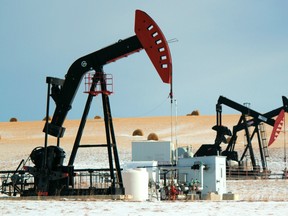Fears that energy exports could be weaponized if a trade war were to erupt between the two countries
Article content
Canada’s disordered response to Donald Trump‘s threat of tariffs, along with fears within the oilpatch that Ottawa could target energy exports as a retaliatory measure, has prompted five of the country’s largest energy-focused industry associations to band together in the face of a potential trade war with the United States.
Article content
Article content
The Canadian Association of Petroleum Producers (CAPP), Pathways Alliance, oilfield industry association Enserva, Explorers and Producers Association of Canada and Canadian Association of Energy Contractors on Monday announced plans to coordinate a joint working group to push back against Trump’s threat of a 25 per cent tariff on all Canadian goods.
Advertisement 2
Article content
“Canada is not where it should be in its preparations for a major trade negotiation with somebody like president Trump,” CAPP president Lisa Baiton said. “Usually at this time, there would be formal industry tables feeding into the Team Canada thinking and positioning, and since that hasn’t happened yet … we’ve set up our own table.”
Part of the fear gripping the Canadian oil and gas sector, which accounts for around a quarter of all Canada’s exports, is that energy exports could be weaponized if a trade war were to erupt between the two countries.
Foreign Affairs Minister Mélanie Joly on Sunday said “everything is on the table” when asked during an interview on CTV’s Question Period program about whether her government would be prepared to cut off energy supplies to the U.S.
Ottawa previously signalled it would consider imposing export taxes on oil, potash and uranium if the Trump administration follows through with its threat to apply blanket tariffs on Canadian goods.
“A countermeasure like that would simply mimic and amplify the negative effects of U.S. import tax. To put it another way: it’s a double tariff,” Baiton said.
Article content
Advertisement 3
Article content
She said either a tariff or an export tax on Canadian crude (or both) could weaken Canadian energy prices, driving down investment and production, while increasing unemployment and costs to consumers.
“We’re in the situation we’re in because we remain locked into one single customer who is now motivated and willing to leverage that position against Canada,” Baiton said.
“Canada needs to wake up. We need to diversify our global customer base, not just for energy, but for all Canadian projects. We should be building pipelines, we should be expediting LNG export facilities, we should be thinking about ports or anything that gives us direct access to global markets without having to go through the U.S.”
The working group, which represents more than three-quarters of Canada’s oil and gas production and hundreds of businesses, said it is offering its expertise to federal and provincial policymakers to come up with strategies to avoid or mitigate the risk of U.S. tariffs.
It said it also plans to engage with American industry counterparts and other influential representatives in the U.S.
Advertisement 4
Article content
The group brings together distinct segments of the oil and gas sector that sometimes disagree on key areas, including net-zero policies, but the industry is largely aligned on the threat of tariffs.
Canada’s major oilsands industry group, the Pathways Alliance, pointed to the long-standing trade relationship between the two countries and Canada’s significance as a supplier, providing the U.S. with more than half its petroleum imports in 2023.
“Canada’s oilsands are a cornerstone of North American energy security, and tariffs will only hurt everyday people on both sides of the border,” Pathways president Kendall Dilling said in a statement.
Many U.S. oil refineries, particularly in the Midwest, are configured to process Canadian heavy crude and have few alternative sources of supply. Experts say a sudden hike in the cost of Canadian oil would hurt refining margins and force higher prices for gasoline, diesel and jet fuel in the U.S.
Weekly U.S. imports of Canadian crude oil reached the highest level on record in the first week of January, according to data from the U.S. Energy Information Administration.
Advertisement 5
Article content
The profound integration of North America’s energy systems through cross-border infrastructure and commercial arrangements had previously prompted some experts and market observers to speculate that Canadian oil and gas could be exempted from the Trump tariffs.
But the Canadian oilpatch appears willing to heed Alberta Premier Danielle Smith‘s warning on Monday — following her informal meetings with Trump at his Mar-a-Lago residence over the weekend — that Canada “needs to be prepared” that tariffs are coming.
Recommended from Editorial
-

Danielle Smith warns Trump’s tariffs are coming
-

Tariffs would plunge Canada into recession
“This situation doesn’t appear to have resolved itself, despite some good efforts from some governments,” CPAC president Tristan Goodman said, crediting Smith for engaging directly with the incoming U.S. president.
“But it is coming up on the inauguration day, and given the lack of resolution, we thought it was important to move quickly.”
• Email: mpotkins@postmedia.com
X: @mpotkins
Bookmark our website and support our journalism: Don’t miss the business news you need to know — add financialpost.com to your bookmarks and sign up for our newsletters here.
Article content
Oilpatch industry associations band together to fight U.S. tariffs
2025-01-14 12:32:04







